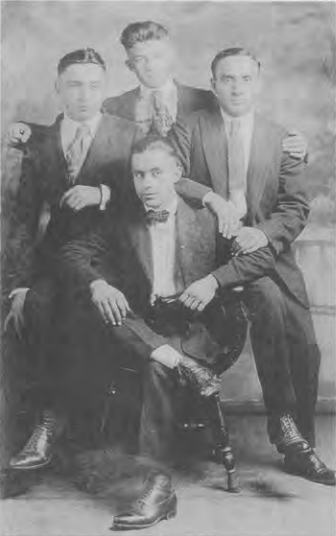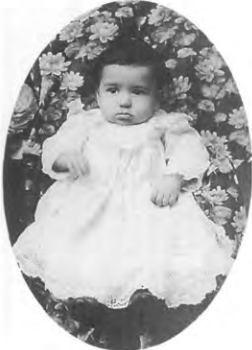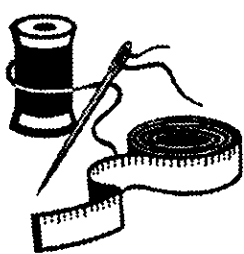Main Body
Chapter 4. Father and Mother Begin Life Anew in Cleveland
Grandpa Romanelli and young Nicola arrived in November of 1906. Father often spoke of his nervous anticipation as he awaited their arrival, how he had hoped and prayed that they would like how he had worked things out in the flat, and especially how they would adjust to living in four rooms on the third floor of a tenement that housed so many families in such close quarters in a strange city and country! He had not given much thought as to how he would be able to adjust to being a father to a son, a husband to a wife, and a son-in-law to a father-in-law he had not seen for six years!
According to father, grandpa Romanelli took charge of young Nicola, making it possible for father to begin what he referred to as his second courting of his bride of six years, spending virtually all of his non-working hours regaining the connubial relationship that had been suspended for the last six years! Nicola was enrolled in the first grade at the Eagle Elementary School, located fortunately only a few blocks away from the Block. I understand that he was a precocious youngster and learned the English language quickly, and by the end of his first year in school, had become a well adjusted student. Grandpa Romanelli saw to it that he got to and from school safely in the beginning. However, being a gregarious youngster, Nick, as he was now known in school, soon walked to school with his new school friends.
By the Fall of 1907, nature had taken its course with father and mother. On October 2, 1907, they were blessed with their first son to be born in the United States! The child was baptized Mario Saverio after grandpa Romanelli, following the custom in some Italian families, where a second son is named after the mother’s father. This meant that Grandpa had another child to take charge of. He was the ideal baby-sitter. This was a great help to mother, who now for the first time found that housekeeping and the running of a household was entirely her responsibility. Here in America, she did not have the luxury of hired help to do for her as she had in Italy! By this time, father had studied hard and had passed the citizenship examination and had received his citizenship papers. Over the years, he would proudly say that it was the first high point in his life in America. He would add, “I accomplished two things, first I became an American and second, because I did so, my son Nicola became an American too!” He would explain that according to the law, if a father became a citizen before his child reached the age of 18, the child would automatically become a citizen too.
Father continued to work for the Mike Lavin Tailoring Shop, earning, I have been told, the magnificent sum of ten dollars for an ordinary suit coat completed, and fifteen dollars for a formal jacket. Rent for the four room flat, I understand, was six dollars a month at that time. So, if father made at least one garment a week, the family could get by. At those times when he received material for two coats and completed them in a week, they lived a little better. Being as frugal as they were, they managed to pay the rent, keep enough food on the table, take care of other household expenses, and still put a little away in the bank!
On December 8, 1908, the family was increased by the birth of another son, Giuseppe, named after father’s brother the priest, who alone maintained contact by mail. In later years, I learned that this second son to be born in the United States was precocious like Nick, and by the time he was two years old, was showing signs of a high degree of intelligence and physical prowess. Young Giuseppe was stricken with the Flu in the year 1912. He died in December of that year. My parents were distraught. The shock of losing two infant sons in the early years of their marriage had lasting effects on father and mother. Mother was pregnant with me at the time. I was only three months away from birth. I have often wondered whether the great grief and sense of her loss affected my development while she was carrying me. I do know that I did suffer from her over protection during my childhood, which I am sure was caused by the fear that she might lose me too! Father was affected in another way. He sank into a deep depression for a time. I understand that, for a period of about four years, he made a daily pilgrimage to Calvary Cemetery to visit his son’s grave. Since father never owned an automobile, he made that long trip from downtown Cleveland to the cemetery by street car. Mother once told me that on one occasion father had not returned from the cemetery in a reasonable period of time. Fearing that something might have happened to him, and since he had been gone longer than usual, mother sent grandpa to look for him! Father was found, still grieving at the grave site.

author’s oldest brother (extreme
right) as member of Central High
School vocal quartet, 1918

months of age, 1913
I was born on March 11, 1913. I was delivered by Angela Fiocco, the local midwife, at 2:00 A.M. on a cold Tuesday morning. In filling out my birth certificate she carefully noted that I was child number 5. My brother Nick, who was going on thirteen when I was born, told me in later years that father partially emerged from his deep depression on the day I was born. Nick told me that he firmly believed that my arrival helped my father get back on the road to normality.
Grandpa Romanelli continued to be our baby-sitter, guardian, and mentor. He took good care of us. Our four room flat was now quite crowded with three adults and three children. When things got hectic, Grandpa would hustle us out-of-doors for a walk or to visit his old friend, Rocco Lavigna, who had a small shoe shine shop near the Hay Market.
On other occasions, when Grandpa made his weekly visits to Hanratty’s Saloon on Ontario Street with his shiny quart size pail for his ration of beer, he would take one or another of us with him after some cajoling. Hanratty’s huge bar that seemed to stretch from one end of the room to the other with its shiny brass foot rail fascinated me because one end of the bar was invariably loaded with large platters of cold meats, breads, and rolls of every kind, accompanied by huge jars of pickles and pig’s feet in brine. Those were the days when bar customers could buy a schooner of beer for a nickel and make themselves a free sandwich. The huge containers of pretzels were my favorites, because the bartender never failed to give me a hand full of pretzels when Grandpa paid for his pail of beer. Those visits were always short, but profitable as far as I was concerned!
When I was about four years old, I recall another memorable occasion on a cold February night, sometime after midnight, when my older brothers and I were awakened by Grandpa Romanelli. He informed us that mother was about to give birth and that father had gone to summon Angela Fiocco, the midwife who lived on Orange Avenue some distance away. Needless to say, there was great excitement in the house that night. Grandpa was extremely nervous and worried for fear that father and the midwife would not get back in time, because neither father nor the midwife had an automobile. They were on foot! Fortunately, they returned in plenty of time. Brother Arthur, was born with the dawn of February 7, 1917.

